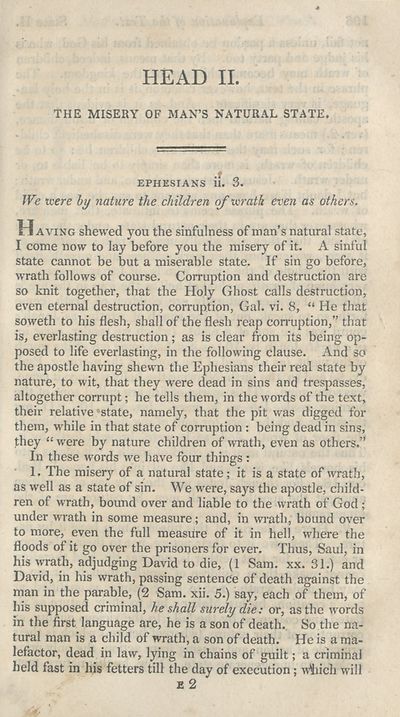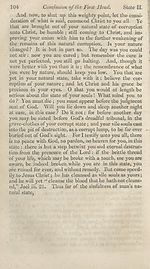Download files
Complete book:
Individual page:
Thumbnail gallery: Grid view | List view

HEAD II.
THE MISERY OF MAN’S NATURAL STATE.
EPHESIANS il. 3.
JVe were by nature the children of wrath even as others.
Having shewed you the sinfulness of man’s natural state,
I come now to lay before you the misery of it. A sinful
state cannot be but a miserable state. If sin go before,
wrath follows of course. Corruption and destruction are
so knit together, that the Holy Ghost calls destruction,
even eternal destruction, corruption, Gal. vi. 8, “ He that
soweth to his flesh, shall of the flesh reap corruption,” that
is, everlasting destruction; as is clear from its being op¬
posed to life everlasting, in the following clause. And so
the apostle having shewn the Ephesians their real state by
nature, to wit, that they were dead in sins and trespasses,
altogether corrupt; he tells them, in the words of the text,
their relative “state, namely, that the pit was digged for
them, while in that state of corruption : being dead in sins,
they “ were by nature children of wrath, even as others.”
In these words we have four things:
1. The misery of a natural state; it is a state of wrath,
as well as a state of sin. We were, says the apostle, child¬
ren of wrath, bound over and liable to the wrath of God;
under wrath in some measure; and, in wrath, bound over
to more, even the full measure of it in hell, where the
floods of it go over the prisoners for ever. Thus, Saul, in
his wrath, adjudging David to die, (1 Sam. xx. 31.) and
David, in his wrath, passing sentence of death against the
man in the parable, (2 Sam. xii. 5.) say, each of them, of
his supposed criminal, he shall surely die: or, as the words
in the first language are, he is a son of death. So the na¬
tural man is a child of wrath, a son of death. He is a ma¬
lefactor, dead in law, lying in chains of guilt; a criminal
held fast in his fetters till the day of execution; w^iich will
2
THE MISERY OF MAN’S NATURAL STATE.
EPHESIANS il. 3.
JVe were by nature the children of wrath even as others.
Having shewed you the sinfulness of man’s natural state,
I come now to lay before you the misery of it. A sinful
state cannot be but a miserable state. If sin go before,
wrath follows of course. Corruption and destruction are
so knit together, that the Holy Ghost calls destruction,
even eternal destruction, corruption, Gal. vi. 8, “ He that
soweth to his flesh, shall of the flesh reap corruption,” that
is, everlasting destruction; as is clear from its being op¬
posed to life everlasting, in the following clause. And so
the apostle having shewn the Ephesians their real state by
nature, to wit, that they were dead in sins and trespasses,
altogether corrupt; he tells them, in the words of the text,
their relative “state, namely, that the pit was digged for
them, while in that state of corruption : being dead in sins,
they “ were by nature children of wrath, even as others.”
In these words we have four things:
1. The misery of a natural state; it is a state of wrath,
as well as a state of sin. We were, says the apostle, child¬
ren of wrath, bound over and liable to the wrath of God;
under wrath in some measure; and, in wrath, bound over
to more, even the full measure of it in hell, where the
floods of it go over the prisoners for ever. Thus, Saul, in
his wrath, adjudging David to die, (1 Sam. xx. 31.) and
David, in his wrath, passing sentence of death against the
man in the parable, (2 Sam. xii. 5.) say, each of them, of
his supposed criminal, he shall surely die: or, as the words
in the first language are, he is a son of death. So the na¬
tural man is a child of wrath, a son of death. He is a ma¬
lefactor, dead in law, lying in chains of guilt; a criminal
held fast in his fetters till the day of execution; w^iich will
2
Set display mode to:
![]() Universal Viewer |
Universal Viewer | ![]() Mirador |
Large image | Transcription
Mirador |
Large image | Transcription
| Antiquarian books of Scotland > Religion & morality > Human nature in its fourfold state > (123) |
|---|
| Permanent URL | https://digital.nls.uk/118585172 |
|---|
| Description | Thousands of printed books from the Antiquarian Books of Scotland collection which dates from 1641 to the 1980s. The collection consists of 14,800 books which were published in Scotland or have a Scottish connection, e.g. through the author, printer or owner. Subjects covered include sport, education, diseases, adventure, occupations, Jacobites, politics and religion. Among the 29 languages represented are English, Gaelic, Italian, French, Russian and Swedish. |
|---|

